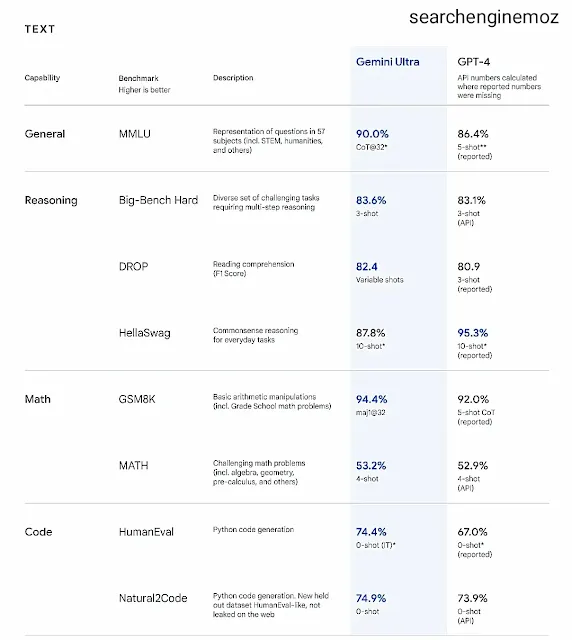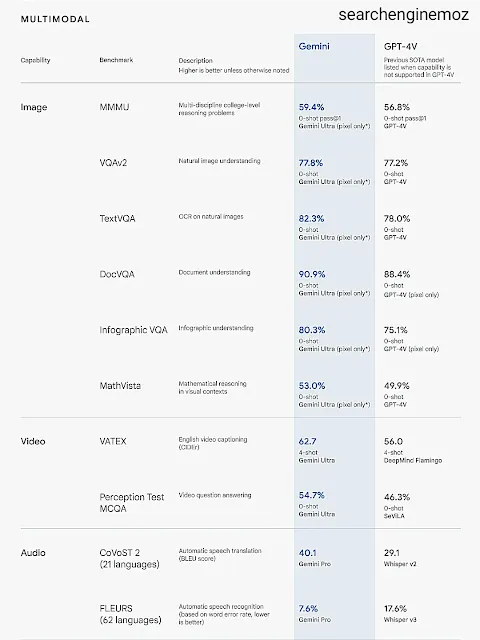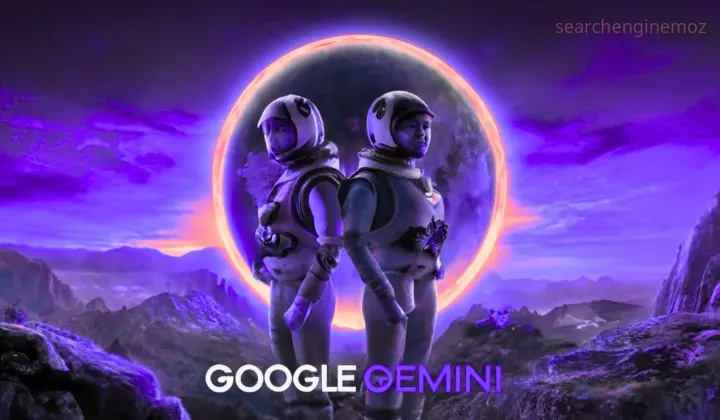Gemini an advanced and highly sophisticated AI model
Every technology shift represents a unique opportunity to propel scientific
discovery, propel human progress, and enhance lives. In the present era, the
transition unfolding with artificial intelligence (AI) stands out as the
most profound transformation in our lifetimes, surpassing even the shifts to
mobile and the web.
The impact of AI extends beyond mere convenience; This
transformative force is poised to usher in unprecedented waves of
innovation, fostering economic progress and steering knowledge, learning,
creativity, and productivity to unprecedented heights. The ripple effects of
AI promise to redefine the way we perceive and interact with the world,
charting a course toward a future characterized by unparalleled advancements
and possibilities.
Our opportunity is to make AI accessible and useful to people around the world.
As Google embarks on its eighth year as an AI-first company, the momentum
of advancements continues to surge, offering the world the prospect of
leveraging artificial intelligence to enhance lives universally. The
transformative influence of generative AI has become increasingly palpable
as millions of individuals seamlessly integrate this technology into their
daily lives through various Google products. Over the past year, the
capabilities of generative AI have burgeoned, empowering users to tackle
more intricate queries and fostering collaborative efforts through
innovative tools.
Concurrently, a burgeoning community of developers
worldwide harnesses the power of Google's models and infrastructure to craft
novel applications, further expanding the reach and impact of generative AI.
This collaborative synergy extends beyond individual developers to include a
growing array of startups and enterprises globally, each flourishing with
the integration of Google's AI tools. The collective endeavor is not just a
technological evolution; it signifies a profound opportunity to make AI
truly beneficial for everyone, everywhere across the globe.
The remarkable momentum achieved in the field of artificial intelligence is
but the inception of a journey that promises even greater
possibilities.
Google approaches this transformative work with a combination of boldness
and responsibility. The commitment involves ambitious research endeavors
aimed at unlocking capabilities that can bestow substantial benefits upon
individuals and society. Simultaneously, Google integrates safeguards,
collaborates with governments, and engages with experts to proactively
address potential risks as AI evolves. The dedication extends to investing
in cutting-edge tools, foundational models, and robust infrastructure,
guided by the ethical principles embedded in Google's AI framework.
Now, the journey takes a significant stride forward with the introduction
of Gemini, Google's most advanced and versatile model to date. Boasting
state-of-the-art performance across diverse benchmarks, Gemini 1.0 is
optimized in three distinct sizes: Ultra, Pro, and Nano. These iterations
mark the inaugural models of the Gemini era and materialize the visionary
objectives set forth when Google formed DeepMind earlier in the year.
The
emergence of these groundbreaking models symbolizes one of the most
extensive science and engineering initiatives undertaken by the company,
paving the way for a future laden with exciting possibilities and
unprecedented opportunities that Gemini is poised to unlock for individuals
worldwide.
Introducing Gemini
In the words of the CEO and Co-Founder of Google DeepMind, on behalf of the
Gemini team.
With a lifelong dedication to artificial intelligence (AI), the CEO
recounts a journey that began in adolescence, programming AI for computer
games, and evolved through years of neuroscience research aimed at
unraveling the mysteries of the human brain. The driving force behind this
odyssey has always been the belief that creating intelligent machines holds
the key to unlocking unprecedented benefits for humanity.
At the heart of Google DeepMind's mission is the commitment to building a
new era of AI models, drawing inspiration from the way individuals perceive
and interact with the world. The aspiration is to develop AI that transcends
the conventional notion of smart software, instead embodying a utility and
intuitiveness reminiscent of an expert helper or assistant, all in pursuit
of a world responsibly empowered by the transformative capabilities of
artificial intelligence.
Today marks a significant stride toward our vision of a more intelligent
and versatile future as we proudly unveil Gemini, the pinnacle of our
advancements in artificial intelligence.
This extraordinary model is the culmination of extensive collaborative
efforts spanning various teams across Google, including the dedicated minds
at Google Research. Unlike any model before it, Gemini is meticulously
designed to be multimodal, exhibiting the unparalleled ability to
comprehend, seamlessly navigate, and synthesize diverse forms of information
such as text, code, audio, image, and video.
What sets Gemini apart is not just its capability, but also its
adaptability. Crafted with versatility in mind, this model can efficiently
operate across a spectrum of platforms, ranging from powerful data centers
to the constraints of mobile devices. The introduction of Gemini signifies a
transformative leap forward, offering state-of-the-art capabilities that
will revolutionize how developers and enterprise customers engage with and
scale their artificial intelligence endeavors.
The Gemini 1.0 release caters to diverse needs with three optimized
versions 👇
- Gemini Ultra ✅ a robust model tailored for highly complex tasks.
- Gemini Pro ✅ our top-tier solution for scaling across a broad range of tasks.
- Gemini Nano ✅ a compact and efficient model ideal for on-device applications, reflecting our commitment to democratizing access to cutting-edge AI capabilities.
State-of-the-art performance
Google has extensively tested its Gemini models and demonstrated their
capabilities in various tasks. Gemini Ultra, in particular, stands out by
surpassing current state-of-the-art benchmarks on 30 out of 32 widely-used
academic benchmarks in the realm of large language model (LLM) research and
development.
Interestingly, Gemini Ultra achieved an unprecedented score of
90.0% on the MMLU (Massive Multitask Language Undertaking) benchmark, the
first instance of a model outperforming human experts. Consisting of 57
subjects spanning mathematics, physics, history, law, medicine and ethics,
the MMLU serves as a comprehensive test of both worldly knowledge and
problem-solving ability.
This remarkable feat is attributed to Gemini Ultra's advanced reasoning
capabilities, allowing it to approach complex questions with a thoughtful
strategy, resulting in substantial improvements over models relying solely
on initial impressions.
 |
| Gemini surpasses state-of-the-art performance on a range of benchmarks including text and coding |
Furthermore, Gemini Ultra exhibits cutting-edge performance on the MMMU
benchmark, attaining a state-of-the-art score of 59.4%. This benchmark
encompasses multimodal tasks across various domains, necessitating
deliberate reasoning.
The model's success on these benchmarks not only showcases its ability to
excel in diverse and complex tasks but also underscores its inherent
multimodality. Gemini Ultra excels in image benchmarks as well, surpassing
previous state-of-the-art models even without the assistance of optical
character recognition (OCR) systems for text extraction from images. These
results signal the early manifestation of Gemini's intricate reasoning
abilities and highlight its native multimodal competence, as detailed in the
Gemini technical report.
 |
| Gemini surpasses state-of-the-art performance on a range of multimodal benchmarks |
Next-generation capabilities
The advent of next-generation capabilities marks a transformative shift in
the realm of multimodal model development. Traditionally, the prevailing
method entailed training distinct components for various modalities and
subsequently integrating them to approximate certain functionalities.
While
these models demonstrated proficiency in specific tasks, such as image
description, they faced challenges in tackling more intricate and conceptual
reasoning. The latest advancements in next-generation capabilities herald a
departure from this conventional approach, promising a more seamless
integration of diverse modalities and enhanced performance across a spectrum
of tasks.
Google conceived Gemini with the intent of making it inherently multimodal,
imbuing it with pre-training that encompassed various modalities from the
outset. Through subsequent fine-tuning with additional multimodal data,
Gemini underwent a refinement process that heightened its efficacy.
This
unique approach allows Gemini to effortlessly comprehend and engage with
diverse inputs, surpassing the capabilities of existing multimodal models.
Across various domains, Gemini stands at the forefront of state-of-the-art
technology, showcasing unparalleled versatility and adaptability. To delve
deeper into Gemini's remarkable capabilities and gain insights into its
functionality, explore further and witness firsthand the cutting-edge
advancements it brings to the realm of multimodal AI.
Sophisticated reasoning
Gemini 1.0 boasts sophisticated multimodal capabilities that empower it to
navigate the intricacies of both written and visual information. Its
proficiency in unraveling complex data sets positions it as an invaluable
tool for extracting elusive knowledge buried within extensive documents. By
adeptly reading, filtering, and comprehending vast amounts of information,
Gemini 1.0 accelerates the pace of breakthroughs across diverse fields,
ranging from scientific research to financial analysis.
The fusion of its
advanced reasoning capabilities with digital speed enables the system to
discern patterns, connections, and insights that might elude traditional
methods, making it an indispensable asset for those seeking a deeper
understanding of complex phenomena.
One of Gemini 1.0's standout features is its unparalleled ability to
comprehend various modalities simultaneously, encompassing text, images,
audio, and beyond. This holistic approach ensures a nuanced understanding of
information, setting the stage for the system to respond intelligently to
queries spanning intricate subjects.
The capability to engage with diverse data types positions Gemini 1.0 as an
exceptional resource for explaining intricate reasoning in fields like
mathematics and physics. Whether deciphering complex mathematical theorems
or elucidating intricate physics concepts, Gemini 1.0 stands out as a
versatile and powerful tool, poised to facilitate a deeper comprehension of
multifaceted subjects through its seamless integration of diverse
modalities.
Advanced coding
Gemini, our Google groundbreaking AI for code generation, has reached a
significant milestone in its capabilities. This versatile model demonstrates
proficiency in comprehending, elucidating, and producing high-quality code
across diverse programming languages such as Python, Java, C++, and Go. Its
cross-language adaptability and capacity to handle intricate information
position Gemini as a leading foundation model for coding worldwide.
The model's prowess extends to excelling in various coding benchmarks,
notably HumanEval and Natural2Code. HumanEval, an industry-standard,
evaluates coding task performance, while Natural2Code, an internal dataset,
utilizes author-generated sources to assess Gemini's coding
capabilities.
The evolution of Gemini into AlphaCode marked a pioneering moment in
AI-assisted coding. Two years ago, we introduced AlphaCode as the inaugural
AI code generation system capable of competing at a high level in
programming competitions. Building upon this success, we have now developed
AlphaCode 2 using a specialized version of Gemini. AlphaCode 2 surpasses its
predecessor by showcasing remarkable improvements, solving nearly twice as
many problems.
Its performance estimate indicates superiority over 85% of
competition participants, a substantial increase from the 50% achieved by
AlphaCode. Notably, collaboration between programmers and AlphaCode 2, where
certain properties are defined for code samples, further enhances its
capabilities.
The unveiling of AlphaCode 2 aligns with our vision of empowering
programmers with highly capable AI models as collaborative tools. These
tools aid in problem reasoning, code design proposals, and implementation
assistance, enabling programmers to expedite app releases and design
superior services.
The technical report for AlphaCode 2 provides comprehensive insights into
its advancements, offering a glimpse into the future of AI-driven coding
solutions.
More reliable, scalable and efficient
Google's Gemini 1.0 represents a significant leap in AI capability,
underscored by its training at scale on Google's AI-optimized infrastructure
utilizing the advanced Tensor Processing Units (TPUs) v4 and v5e. Crafted
in-house, these TPUs serve as the beating heart of Google's AI-powered
ecosystem, including widely-used products such as Search, YouTube, Gmail,
Google Maps, Google Play, and Android. Gemini 1.0 stands out as Google's
most reliable and scalable model for training, paired with enhanced
efficiency in serving diverse applications.
The utilization of TPUs brings about a remarkable boost in performance for
Gemini, outpacing earlier, smaller models. These custom-designed AI
accelerators are pivotal in not only empowering Google's own products but
also enabling businesses worldwide to train large-scale AI models
cost-effectively. In a stride towards continuous innovation, Google
announces the Cloud TPU v5p, the most powerful, efficient, and scalable TPU
system to date.
Engineered specifically for training cutting-edge AI models, this
next-generation TPU is poised to expedite the development of Gemini,
empowering developers and enterprise customers to train large-scale
generative AI models at an unprecedented pace. This advancement ensures that
new products and capabilities derived from Gemini can reach customers
faster, setting a new standard for reliability, scalability, and efficiency
in the AI landscape.
 |
| A row of Cloud TPU v5p AI accelerator supercomputers in a Google data center |
Built with responsibility and safety at the core
Google is steadfast in its dedication to advancing ethical and responsible
AI across its diverse range of initiatives. Aligned with Google's
well-defined AI Principles and the robust safety policies integrated
throughout its product spectrum, the company is strengthening its commitment
by implementing new safeguards specifically tailored to address the
intricate capabilities of Gemini.
Throughout the development stages of
Gemini, Google maintains a meticulous approach, consistently evaluating
potential risks and proactively engaging in comprehensive testing and
mitigation efforts. This proactive stance underscores Google's determination
to ensure the responsible deployment of AI technologies, demonstrating its
commitment to prioritizing user safety and ethical considerations in the
evolving landscape of artificial intelligence.
Gemini stands out as the most extensively evaluated AI model within the
Google ecosystem to date, incorporating comprehensive safety assessments
encompassing aspects such as bias and toxicity. Google has undertaken
pioneering research into emergent risk areas, including cyber-offense,
persuasion, and autonomy. Leveraging the cutting-edge adversarial testing techniques developed by Google Research, the company is proactively
identifying and addressing critical safety concerns well in advance of
Gemini's deployment.
To enhance the robustness of its internal evaluation processes, Google is
collaborating with a diverse array of external experts and partners. This
collaborative effort aims to rigorously stress-test Gemini models across a
spectrum of issues, providing a holistic perspective on potential blind
spots. Additionally, Google is taking a proactive stance on content safety
during Gemini’s training phases.
Using benchmarks such as Real Toxicity Prompts, which consists of 100,000 prompts reflecting varying degrees of
toxicity sourced from the web and developed by experts at the Allen
Institute for AI, Google ensures that Gemini's outputs adhere to stringent
policies. The development of dedicated safety classifiers and filters,
designed to identify and mitigate content featuring violence or negative
stereotypes, further underscores Google’s commitment to crafting an
inclusive and secure AI framework.
The ethos of responsibility and safety serves as the cornerstone of
Google's unwavering commitment to the development and deployment of models.
This steadfast commitment to long-term ethical practices necessitates a
collaborative approach, prompting Google to actively engage with the
industry and the broader ecosystem.
Through strategic partnerships with
organizations such as MLCommons, the Frontier Model Forum, the AI Safety Fund, and the Secure AI Framework (SAIF), Google exemplifies its dedication
to shaping best practices and establishing robust safety and security
benchmarks within the dynamic landscape of artificial intelligence.
The
company's pledge extends beyond industry collaborations to ongoing
engagement with researchers, governments, and civil society groups globally,
underscoring its dedication to refining and developing models like the
Gemini model in a responsible and secure manner.
Gemini 1.0 is currently rolling implemented across a diverse array of
products and platforms 👇
Gemini Pro in Google products
Google is introducing Gemini to billions of users, marking a pivotal moment
in the evolution of its digital assistant, Bard. This upgraded version of
Bard leverages Gemini Pro's refined capabilities, enhancing reasoning,
planning, and comprehension. Available in English across more than 170
countries and territories, this major Bard update is the most substantial
since its initial launch. Google envisions further expansion, with plans to
introduce Gemini to diverse modalities and support additional languages and
locations in the near future.
Furthermore, Google is integrating Gemini into its hardware, starting with
the Pixel 8 Pro smartphone. This device is engineered to run Gemini Nano,
empowering innovative features such as Summarize in the Recorder app and
Smart Reply in Gboard. Initially deployed in messaging apps like WhatsApp,
Line, and KakaoTalk, Gemini Nano is set to expand its reach to more
messaging platforms in the coming year.
Google's commitment to Gemini extends beyond Pixel devices, with plans to
integrate the technology into other products and services such as Search,
Ads, Chrome, and Duet AI. Early experiments with Gemini in Search have
already demonstrated tangible benefits, including a 40% reduction in latency
in the U.S., contributing to a faster and more efficient Search Generative Experience (SGE) for users, accompanied by improvements in result quality.
The trajectory of Gemini's integration promises a future where AI plays an
increasingly central role in enhancing the functionality and performance of
Google's diverse offerings.
Building with Gemini
Building with Gemini has become more accessible for developers and
enterprise customers, starting from December 13. The introduction of Gemini
Pro via the Gemini API in Google AI Studio and Google Cloud Vertex AI offers
a streamlined and efficient process for utilizing Gemini's
capabilities.
Google AI Studio serves as a free, web-based developer tool, providing the
flexibility to prototype and launch applications swiftly using an API key.
For those seeking a fully-managed AI platform, Google Cloud Vertex AI is the
ideal solution, offering customization options for Gemini, complete data
control, and additional features from Google Cloud tailored for enterprise
needs, including enhanced security, safety, privacy measures, and robust
data governance and compliance.
In addition to these advancements, Android developers can leverage Gemini
Nano, the most efficient model for on-device tasks. This is made possible
through AICore, a novel system capability introduced in Android 14. Starting
with Pixel 8 Pro devices, developers gain access to the benefits of Gemini
Nano, enhancing on-device AI capabilities. Those eager to explore this
integration can sign up for an early preview of AICore, tapping into the
potential of Gemini Nano for a range of Android applications.
Gemini Ultra coming soon
Gemini Ultra, Google's highly anticipated advancement in artificial
intelligence, is on the verge of release as the tech giant diligently
completes comprehensive trust and safety assessments. The rigorous
evaluation includes red-teaming conducted by trusted external parties,
ensuring the robustness and reliability of the system.
In tandem with these
efforts, Google is employing fine-tuning and reinforcement learning from
human feedback (RLHF) to further refine the model. Before a broad release,
Gemini Ultra will undergo an initial phase of availability to select
customers, developers, partners, and safety and responsibility
experts.
This early experimentation phase aims to gather valuable insights and
feedback, allowing Google to address any potential issues and optimize the
AI system for a seamless and secure user experience. The culmination of this
meticulous process will see Gemini Ultra becoming accessible to developers
and enterprise customers in the early months of the upcoming year.
Additionally, Google is set to introduce Bard Advanced, a cutting-edge AI
experience slated for launch early next year. Bard Advanced promises to
provide users with unparalleled access to Google's most advanced models and
capabilities, beginning with the introduction of Gemini Ultra. By making
this strategic move, Google demonstrates its dedication to pushing the
limits of AI and providing users with cutting-edge advancements in
artificial intelligence technology. With Bard Advanced, Google is poised to
redefine the landscape of AI applications, offering users an enhanced and
sophisticated interaction with the evolving world of machine learning.
The era Gemini is paving the for a future filled with innovation and progress
The advent of the Gemini era marks a momentous stride in the evolution of
artificial intelligence, signifying a pivotal juncture for Google. This
milestone underscores our commitment to rapid innovation while maintaining a
conscientious approach to advancing the capabilities of our models. The
ongoing development of Gemini is a testament to our dedication to pushing
the boundaries of AI technology responsibly.
As we look ahead, our focus
lies in augmenting its functionalities for forthcoming iterations. This
includes substantial enhancements in planning and memory capabilities, as
well as an expansion of the context window, enabling the processing of even
larger volumes of information. These endeavors are geared towards refining
our models to deliver responses of higher quality and greater contextual
understanding.
The progress achieved with Gemini fuels our enthusiasm for the remarkable
possibilities that lie ahead in a world responsibly empowered by AI. This
vision extends beyond mere technological advancements; it envisions a future
characterized by innovation that transcends boundaries.
The potential of AI
to enhance creativity, extend knowledge, propel scientific discovery, and
revolutionize the way billions of people live and work is both inspiring and
transformative. As we embark on this journey into the Gemini era, we are
poised to contribute to a future where AI serves as a catalyst for positive
change on a global scale.

